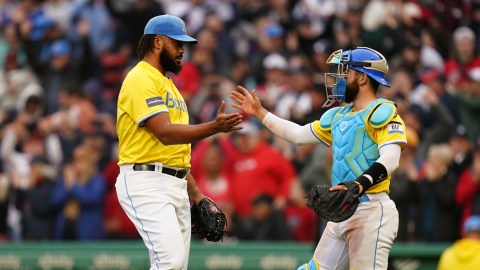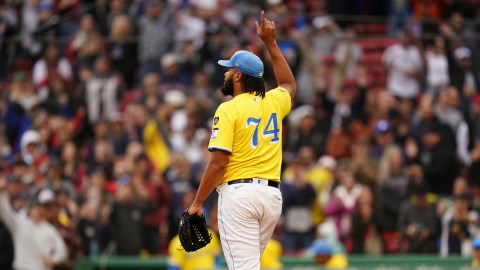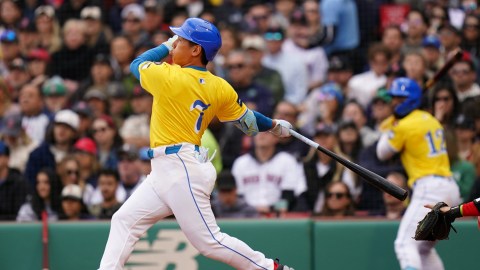 Moneyball was an imperfect movie which presented an oversimplified, insultingly condensed version of the introduction of Sabermetric philosophies to baseball. However, sometimes the simplest explanation is the best approach, and, if nothing else, what the move did was provide a few easily understood analogies to explain the overlying widsom of mathematical analytics to the layman.
Moneyball was an imperfect movie which presented an oversimplified, insultingly condensed version of the introduction of Sabermetric philosophies to baseball. However, sometimes the simplest explanation is the best approach, and, if nothing else, what the move did was provide a few easily understood analogies to explain the overlying widsom of mathematical analytics to the layman.
There's a scene in the movie which feels incredibly relevant to the current MVP debate between Triple Crown winner Miguel Cabrera and rookie phenom Mike Trout. In several ways, it's a debate which pits old school thinking versus the new school, and currently the old paradigm seems to be prevailing — to the detriment of baseball and the understanding of what the "value" of a baseball player really means.
During the scene in Moneyball in which Billy Beane invites Peter Brand – who plays Beane's former assistant Paul DePodesta in the film — to have a Deep Throat-like conversation in a secluded parking garage, the two discuss about the value of the just-departed Johnny Damon. Granted, their conversation includes monetary considerations that aren't park of the MVP debate, but the underlying principle still holds true.
"The Red Sox look at Johnny Damon and they see a star worth seven point five million a year," Brand says in the film. "When I look at Johnny Damon, I see an imperfect understanding of where runs come from."
Likewise, when we look at Cabrera's totals — .330 batting average, 44 home runs, 139 RBIs — we should be impressed with their sheer enormity, but those numbers obscure the fact that they are without context and without holistic consideration of how to determine the relative value of one player compared with another.
Since the word of this piece seems to be "imperfect," it's important to note right off the bat that "wins above replacement" is an imperfect stat. There are at least three different mainstream ways — FanGraphs, Baseball Prospectus and Baseball Reference – that it's calculated, and it's been said that every Major League Baseball team that uses it makes their own subtle tweaks to the WAR algorithm.
That being said, whatever version of the metric you use, Trout has proven to be worth more wins — by a wide margin — than Cabrera.
In that same conversation in Moneyball, Brand's character says, "There is an epidemic failure within the game to understand what's really happening. … Your goal shouldn't be to buy players, your goal should be to buy wins. And in order to buy wins, you need to buy runs."
But you also need to prevent runs, too.
Without getting into the specifics of WAR, to quote Moneyball one last time, "It's about getting things down to one number." The purpose of the stat is to determine, in plain terms, just how many wins one individual basbeball player is responsible for (on the aggregate) as compared to an imaginary "replacement player," which is a statistically average theoretical standard. Unlike pure totals such as home runs or RBIs, it weighs a player's total body of work — including defense — to determine that player's relative value to the mean.
And, in the MVP race, WAR makes it absolutely clear that having Trout on a team gives you a better chance of winning games than having Cabrera.
According to FanGraphs, Trout had a WAR of 10.4. Baseball Prospectus and Baseball Reference calculated similar marks of 9.1 and 10.7, respectively. Likewise, those same three outlets have Cabrera at 7.2, 6.1 and 6.9. For reference, Cabrera ranks eighth, fourth and fifth in each of those rankings, whereas Trout is first in all three; both Buster Posey and Robinson Cano rank above Cabrera in each calculation. Even if you take defense out of the equation, Baseball Reference gives Trout a 1.1-win advantage over the course of 2012.
In short, the baseball purists can say whatever they want. The Triple Crown is a momentous achievement that should be forever remembered as a rare, impressive statistical anomaly. However, Cabrera's overall totals don't change the fact that Trout had the higher value as a baseball player if indeed your idea of value is, you know, winning baseball games.
Cabrera's achievement will go down in baseball history, but when voting for the most valuable player, it suggests a profound misunderstanding of just what value is that the MVP race isn't a lopsided one in favor of Trout — especially among the voters, supposedly baseball experts. We're too far along with the statistical revolution to overlook such obvious context.
The disparty in RBIs between Cabrera and Trout? A function of batting third verus leading off. But how about the runs that Trout created in scoring? What about the fact that Trout plays Gold Glove-caliber defense in center field, while Cabrera plays far below-average defense at either corner infield spot? What of the 49 stolen bases that allowed Trout to create more runs?
The sexy totals don't account for these considerations, and thus don't tell the whole story. As with life so it goes with baseball: context is everything.



